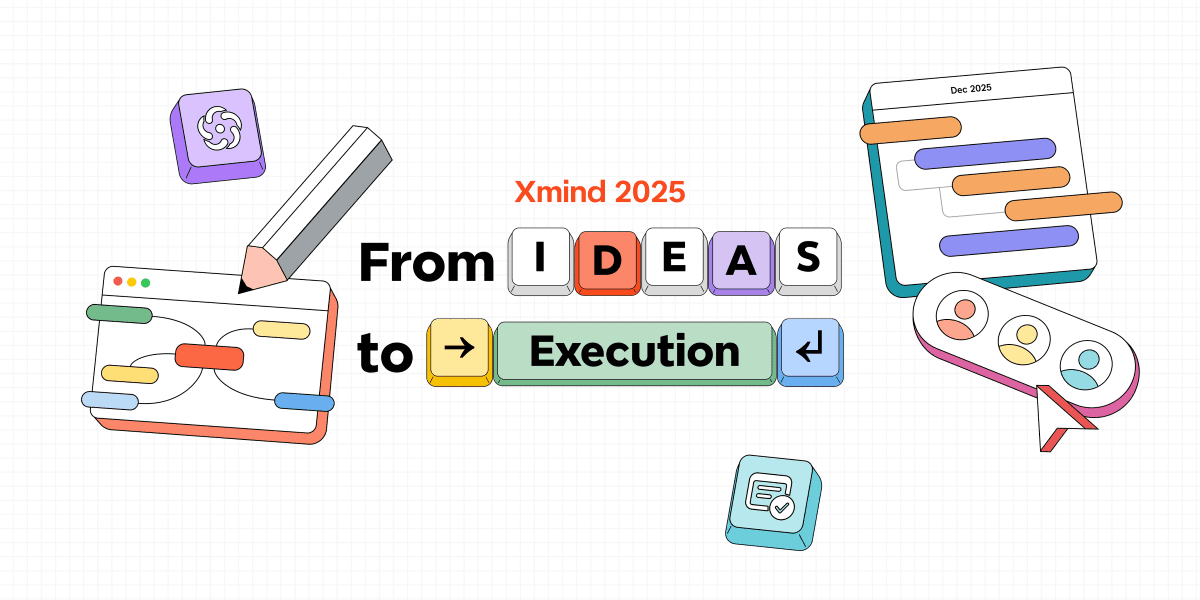2025/09/19
プロジェクト管理学位の価値を探る
今日のスピードが速いビジネス環境では、熟練したプロジェクトマネージャーの需要が増加しています。プロジェクト管理の学位は、プロジェクトを効果的にリードするために必要なスキルを身につけ、プロジェクトを時間内に予算内で完了させることができるようにします。これらの能力を築くと同時に、実践的なツールを活用することも、正式な教育と同じくらい重要です。Xmindのようなプラットフォームは、学生やプロフェッショナルが複雑なプロジェクトを視覚的に構築するのを助け、理論をすぐに実行に移すことができます。
この記事では、プロジェクト管理の学位取得におけるさまざまな側面、その利点、潜在的なキャリアパス、そしてプログラム中に習得するスキルについて掘り下げます。
プロジェクト管理学位とは何か
プロジェクト管理の学位は、さまざまな産業にわたってプロジェクトを管理するために必要な知識とスキルを学生に提供することを目的とした学術プログラムです。この学位は、準学士号、学士号、修士号など、さまざまなレベルで追求することができます。
プロジェクト管理学位の種類
プロジェクト管理の学士号: この学部プログラムは通常4年間で、プロジェクト計画、リスク管理、チームダイナミクスといった基本的な概念をカバーします。多くの機関では、働くプロフェッショナルに柔軟性を提供するためにオンラインのプロジェクト管理学士号を提供しています。
プロジェクト管理の修士号: プロジェクト管理の修士号は通常、学士号取得後1〜2年の学習を必要とします。この高度なプログラムは、戦略的プロジェクト管理、リーダーシップ、そして複雑なプロジェクトの実行についてさらに深く探ります。
証明書およびディプロマ: 完全な学位にコミットすることなくスキルを向上させたい人々のために、さまざまな証明書プログラムが用意されています。これらのプログラムはプロジェクト管理の特定の分野に焦点を当て、短期間で完了することができることが多いです。
プロジェクト管理学位の重要性
プロジェクトを管理する方法を学ぶだけでなく、さまざまなセクターにおけるリーダーシップの役割に備えるのに役立ちます。この学位を追求することが有益である主な理由をいくつか示します。
キャリアの向上
プロジェクト管理の学位を持つことは、キャリアの可能性を大いに向上させることができます。雇用者はしばしば、プロジェクト管理における正式な教育を受けている候補者を好みます。これは、その分野へのコミットメントと基本的な概念の確固たる理解を示すからです。
スキル開発
プロジェクト管理プログラムの学生は、次のような多様なスキルセットを習得します。
リーダーシップ: チームを効果的に導き、メンバーがプロジェクトの目標を達成するために動機付ける方法を学びます。
コミュニケーション: アイデアをステークホルダーに明確に伝えるための優れた口頭および書面によるコミュニケーションスキルを開発します。
問題解決: 問題を特定し、迅速に効果的な解決策を実施する能力を身につけます。
ネットワーキングの機会
多くのプロジェクト管理プログラムは、インターンシップ、ワークショップ、業界イベントを通じてネットワーキングの機会を提供します。この分野のプロフェッショナルとつながりを持つことで、将来の就職機会やコラボレーションにつながることがあります。
プロジェクト管理学位プログラムで学ぶこと
プロジェクト管理の学位は、学生を実世界の課題に備える幅広いトピックを網羅しています。ここでは、通常カバーされる主要な科目をいくつか紹介します:
プロジェクト計画とスケジューリング
学生は詳細なプロジェクト計画を作成する方法を学びます。これには、タイムライン、リソースの割り当て、タスクの割り当てなどが含まれます。締め切りを守るためには効果的なスケジューリングの理解が不可欠です。
リスク管理
この分野は、プロジェクトに影響を与える可能性のあるリスクを特定し、それを軽減するための戦略を開発することに焦点を当てています。学生はリスクの分析方法とコンティンジェンシープランの作成を学びます。
品質管理
プロジェクトが要求される基準を満たすことが重要です。学生は品質保証プロセスについて学び、プロジェクトライフサイクルを通じてそれを実施する方法を習得します。
財務管理
予算編成と財務報告の理解はプロジェクトマネージャーにとって重要です。学生はプロジェクトの予算を管理し、経費を追跡し、財務的な説明責任を確保する方法を学びます。
プロジェクト管理学位によるキャリア機会
プロジェクト管理の学位を持つ卒業生は、さまざまな業界で幅広いキャリアパスにアクセスできます。建設、IT、ヘルスケア、金融まで、ほぼすべてのセクターでプロジェクトを計画、実行、効率的に進めることができるプロフェッショナルが求められています。一般的な役職をいくつか紹介します:
プロジェクトマネージャー
プロジェクトマネージャーとして、プロジェクトの開始から完了までの監督を担当します。この役割にはチームの調整、予算管理、プロジェクト目標の時間内達成と範囲内達成の確保が含まれます。プロジェクトマネージャーはしばしばステークホルダーのメインコンタクトとして機能し、プロジェクトライフサイクル中に発生する問題を解決しつつ、期待値を管理します。強力なコミュニケーションとリーダーシップスキルが不可欠で、チームを動機付け同じ目標に向けて団結させることが求められます。
プログラムマネージャー
プログラムマネージャーは、組織内の複数の関連するプロジェクトを監督する戦略的レベルで活動します。彼らの焦点は、個々の成果物を超えて、すべてのプロジェクトがより広範なビジネス目標に寄与することを確実にすることにあります。これには、チーム横断的なリソース管理、複数のプロジェクトにわたるリスクの軽減、長期的な成果の測定が必要です。プログラムマネージャーはしばしばシニアエグゼクティブと密接に協力し、組織戦略に影響を与えることを目指す人々にとって理想的な役割です。
プロジェクトコーディネーター
プロジェクトコーディネーターは、会議のスケジュール作成、レポートの準備、タイムラインの監視といった管理タスクを担当し、プロジェクトマネージャーをサポートします。また、プロジェクトの進行状況を追跡し、文書が正確で最新であることを確認する手助けもします。この役割は、プロジェクトワークフローにおける実践的な経験を提供し、プロジェクト管理職への進出に繋がるスキルを開発できる優れた入り口です。
プロジェクトマネージャーになるためにプロジェクト管理学位が必要か?
プロジェクト管理学位—学士または修士レベル—は、プロジェクトをリードするための強固な基盤を提供します。しかし、すべてのプロジェクトマネージャーが伝統的な学術の道を進むわけではありません。事実、「プロジェクトマネージャーになるためにどの学位が必要ですか?」という質問に対する答えは、常に単一の経路ではありません。この分野で成功するために必要なスキルや資格を築くための代替手段が存在します。
代替措置としてのプロジェクト管理認定
プロの認定は、学位を持たない人々にとって最も認識された経路の1つです。PMP(プロジェクトマネジメントプロフェッショナル), CAPM(認定アソシエイトプロジェクトマネージャー), およびPMI-ACP(アジャイル認定プラクティショナー)のようなプログラムは、プロジェクトとチームを管理する能力を証明します。これらの資格は世界中の雇用主に尊重され、正式なプロジェクト管理学位がない場合の能力証明としてしばしば役立ちます。
オンラインプロジェクト管理学習
フルタイムのキャンパス教育にコミットすることなく、構造化された学習を望む学習者にとって、オンラインのプロジェクト管理学士号は優れた選択肢です。多くの大学やトレーニングプロバイダーが、計画、スケジューリング、およびリーダーシップをカバーする柔軟なオンラインプログラムを提供しています—プロジェクト管理の基本要素です。オンライン学習では、インタラクティブなモジュールや仮想グループプロジェクトなど、さまざまなリソースへのアクセスも提供され、仕事や個人的なコミットメントをバランスさせながら実践的なスキルを身につけることができます。
実践を通じて経験を積む
プロジェクト管理のキャリアを始めるもう一つの方法は、実践的な経験を積むことです。プロジェクトコーディネーターやチームリーダーといったエントリーレベルの役職に就くことで、実際のプロジェクトワークフロー、ステークホルダーとのコミュニケーション、スケジューリングを経験することができます。社内イニシアチブへのボランティア活動でさえも、認定やオンライン学習を補完する実績のあるトラックレコードを築くのに役立ちます。時間が経つにつれて、この実践的な基盤は プロジェクト管理の修士号 などの高等教育と組み合わせてキャリアの機会をさらに広げることができます。
オンライン学習でのXmindの支援
プロジェクト管理の学位取得、認定資格への準備または学位プログラム以外のスキル獲得をする際、Xmindのようなツールは、理論と実践の架け橋を築く手助けをします:
WBSとプロジェクト計画の練習
すべてのプロジェクト管理コースは、基盤としてワークブレークダウンストラクチャ(WBS)を強調します。学生はしばしば、新製品の発売やITシステムの構築といった大規模なイニシアティブを成果物とサブタスクに分割する課題を課せられます。
ここでXmindが実践的なツールとして登場します:
プロジェクトの可能性のあるすべての要素をブレーンストーミングするためにマインドマップを開始します。
作業パッケージに明確な階層を与えるためにツリーチャートに洗練します。
「プロトタイプ」を「テスト」にリンクするなどの依存関係を示すためにリレーションシップを追加します。
タスクの状態、期限、または優先順位を追跡するためにマーカーを適用します。
Xmind内で専門的なWBSの構築をシミュレーションすることで、学生は教室の課題を完了するだけでなく、実際のプロジェクト計画に備えることができます。

オンライン学習資料の整理
オンラインプログラムは、何十もの読み物、録音された講義、ケーススタディの課題を含むことがあります。Xmindは、この情報過多を構造化された知識システムに変えるのを助けます。
各トピックの下に重要な講義ポイントをまとめたノートを添付します。
「リスク評価方法」や「軽減戦略」など、関連する概念を一つのクラスターにまとめるために境界を設定します。
試験に重要な内容に赤い旗を付けるなど、マーカーを使用して優先的な学習エリアを強調します。
分散したPDFやコースプラットフォームをめくる代わりに、学習者はXmindでビジュアル「学習ダッシュボード」を構築することができ、学習セッションをより速く、はるかに効率的に行えます。
チームコラボレーションのシミュレーション
チームプロジェクトは、修士課程のプロジェクト管理学位プログラムやオンラインコースの必須部分です。Xmindは、リモートコラボレーションをスムーズかつ現実的にします。
リアルタイムコラボレーションにより、グループは時差を越えて一緒にWBS構造やプロジェクトのタイムラインをブレインストーミングすることができます。
コメントは、メールの長いスレッドと比較して混乱を減少させながら、特定のトピックにディスカッションを結びつけます。
クラウド同期により、すべてのメンバーがプロジェクトマップの最新バージョンにアクセスできます。
あるオンラインのプロジェクト管理学士プログラムの学生グループは、Xmindを使用してイベントプロジェクトを計画します。それぞれのメンバーは自身の分岐にタスクを追加し(例:ロジスティクス、マーケティング、予算)、依存関係についてコメントし、セクションを色分けします。その結果、プロフェッショナルなチームワークを反映する共有の生きたWBSが出来上がります。
学習成果をプロフェッショナルアウトプットに変換する
学術的な作業はしばしば、教授やクラスメート、または認定委員会に対してプロフェッショナルな形式で提示される必要があります。Xmindはこの移行をスムーズにします。
アウトラインモードは、エッセイやレポートにコピーできる線形のテキストベースのビューを提供します。
ピッチモードは、クラスの簡単説明または認定模擬試験に理想的なステップバイステップのプレゼンテーションにWBSを変換します。
エクスポートオプションにより、マップをPDF、PPT、Excel、またはMarkdownとして保存し、学術的提出要件との互換性を確保します。
マップショットは、特定のWBSセクションを研究論文やオンラインディスカッションに含めるためのスナップショットを作成します。
学術要件 | Xmindの機能 | 実践的なアウトプット |
|---|---|---|
プロジェクト計画を提出する | PDFとしてエクスポート | 成績評価のためにフォーマットされた文書 |
クラスメートにプレゼンする | ピッチモード | スライドバイスライドの説明 |
勉強グループと共有 | クラウド同期 | 生きた編集可能なWBSマップ |
エッセイにビジュアルを追加する | マップショット | Wordに埋め込まれたきれいな図 |
柔軟な教育経路とXmindのような実践的なツールを組み合わせることで、正式な学位を追求するかどうかにかかわらず、今日のダイナミックなビジネス環境で成功するために必要なスキルを開発することができます。
結論
プロジェクト管理の学位は、今日の競争の激しい就職市場で貴重な資産です。重要なスキルを身につけるだけでなく、さまざまなキャリアの機会を開くことができます。学士号であれ修士号であれ、得られる知識はプロジェクトを効果的に管理するのに役立ちます。この教育の旅を始める際には、Xmindのようなツールを活用してプロジェクト管理能力を向上させることを検討してください。
よくある質問
プロジェクト管理学位とは何ですか?
プロジェクト管理学位は、さまざまな業界でプロジェクトを効果的に管理する原則と実践を学生に教える学術プログラムです。履修コースは通常、プロジェクト計画、リスク管理、予算編成、スケジューリング、リーダーシップ、コミュニケーションといった科目をカバーします。また、アジャイル、スクラム、ウォーターフォールなどの業界標準のツールと方法論の経験も得られます。卒業後には、プロジェクトを開始から完了まで監督し、目標を時間内に予算内で達成するための能力を備えています。
プロジェクトマネージャーになるにはどの学位が必要ですか?
通常、プロジェクト管理またはビジネス管理、工学、情報技術などの関連分野での学士号が求められます。雇用者はしばしば、インターンシップやエントリーレベルのプロジェクト役職で得られる学術知識と実践的経験の両方を示す候補者を求めます。高度な職位には、PMP(プロジェクトマネジメントプロフェッショナル)やPRINCE2などの修士号やプロフェッショナル認定が、専門知識を示すために必要な場合があります。
プロジェクト管理の修士号で何を期待できますか?
プロジェクト管理の修士号は、戦略的プロジェクト管理、リーダーシップ、複雑なプロジェクト実行の高度な知識を提供します。学生はポートフォリオおよびプログラム管理、変更管理、ステークホルダーエンゲージメント、グローバルプロジェクトリーダーシップといった分野に深く入り込み、多くのプログラムが研究やケーススタディを重要視しています。この学位は、特にキャリアの向上や多国籍企業でのリーダーシップの機会を求めるプロフェッショナルにアピールします。
プロジェクト管理の学士号をオンラインで追求できますか?
はい、多くの機関がオンラインでプロジェクト管理の学士号を提供しており、仕事や個人的なコミットメントと両立させながら学ぶことができます。オンラインプログラムは、インタラクティブな学習コース、仮想グループプロジェクト、実世界のプロジェクト環境を反映するデジタルコラボレーションツールへのアクセスを特徴としています。一部の大学では、時折のワークショップやレジデンシーを組み合わせたハイブリッドモデルを提供しているところもあります。この形式は特に、働くプロフェッショナルや、学びながら実務経験を積みたい人々にとって有益です。





